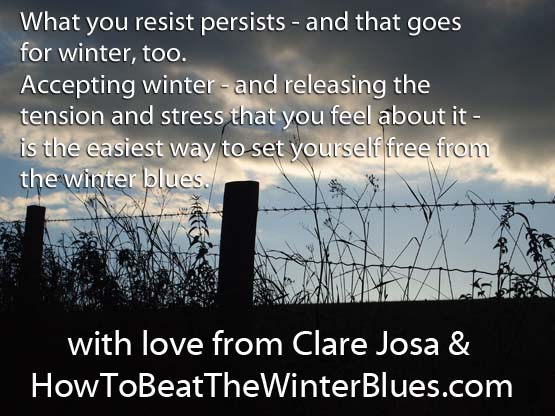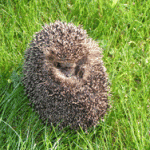Welcome to week 5 of How To Beat The Winter Blues!
How did you get on with last week’s techniques? Have you been movin’ and shakin’ this past week? Any questions? Any insights? Please share them via our Facebook group!
This week we’re moving on to top strategies for letting go of the tension that cold weather (and thinking about the cold!) causes us to store in our bodies. So get ready to release those aches, pains and more, which can last long beyond the winter months. We will be sharing some simple exercises you can do, to release that tension, to help you feel more awake and energised, throughout the year.

Why Do We Tense Up?
Look around a typical street on a cold, frosty day and you’ll notice that we all look the same. Gone are the straight backs and long strides. In are the hunched shoulders and tightly-wrapped arms, as we shuffle our way along, trying to block out the cold.
It doesn’t take long of wearing your shoulders like earrings before you end up with back and neck pain and all the knock-on effects of holding physical tension in our body.
The Problem With Tension…
The problem with tension is that it’s like the old story of boiling a frog. Apparently (being veggie, I’ve never tried this and don’t intend to!) biologists discovered that if you drop a frog into boiling water, it jumps out. However, if you put it into a pan of cold water and heat it up gently, it doesn’t realise what is going on till it’s too late. Yeurch!
Physical tension can be just as bad for you. Rarely do we notice that we’re holding physical tension until things have got pretty bad. Ask any chiropractor or osteopath and they’ll tell you that most people don’t bother going to see them until their problems have become long-term issues. “I thought it would go away” is a phrase they hear all too often.
 When I’m teaching meditation, we always do warm-up exercises, before we even think about relaxing or meditating, to release the build-up of tension in the body. Without releasing the tension, it’s almost impossible to sit still or concentrate. The low-level (or higher) stress that most of us experience day-to-day is enough to build up physical tension that needs to be dealt with. The problem with winter is that cold weather tends to make things even worse.
When I’m teaching meditation, we always do warm-up exercises, before we even think about relaxing or meditating, to release the build-up of tension in the body. Without releasing the tension, it’s almost impossible to sit still or concentrate. The low-level (or higher) stress that most of us experience day-to-day is enough to build up physical tension that needs to be dealt with. The problem with winter is that cold weather tends to make things even worse.
When we feel cold, we tend to tense up. It’s as though we’re trying to curl up, like a hibernating hedgehog.
After just a few hours of holding your body in a tense position, it can start to impact your health. The symptoms aren’t always obvious, for example: tension in the neck, shoulders and uppper back can inhibit the free flow of oxygen to the brain, making it hard to think straight!
Typical symptoms of physical tension:
- Headaches
- Stomach / digestive problems
- Neck pain
- Back pain
- Difficulties concentrating
- Feeling “low” due to low-level aches, pains and concentration problems
- Lymphatic system unable to work properly (can lead to build-up of toxins and impacts the immune system)
So it’s worth dealing with this tension before it takes hold.
How To Deal With Physical Tension
- Are you fighting the cold?
As Carl Jung told us:“What you resist persists.”
So the easiest thing you can do is to spot when you’re tensing up – when you’re “resisting the cold” – and to allow your body to relax. Give it a go, next time you’re feeling cold. It might sound weird, but relaxing that tension can actually make you feel warmer!
“Resisting” the cold means we’re giving it all of our attention, focusing on it, noticing how it makes us feel, therefore feeling colder. Accepting it, releasing the tension and simply letting go of thoughts about the cold mean we allow our body’s heating mechanisms to work more effectively and will soon feel warmer.
Relax, have a good stretch (in whichever way is comfortable for you!) and let the tension (and the cold!) go.
Of course, make sure you’re warm enough! Extra layers, especially around the kidneys (adrenal glands get stressed if we’re too cold) can make a massive difference. Being warm enough is essential for your mental, emotional and physical health over winter.
.
- Are you wearing your shoulders as earrings?
We store a huge amount of tension in our shoulders.
This tension interrupts the free flowing of all the body’s energy systems between the brain and the rest of the body and it can make us feel tired and low. It can make it hard to think clearly, which can lead to stress.
The easiest way to release this tension is to lift your shoulders right up to your ears (or as far as they’ll comfortably reach!) and hold them there for a second, then let them drop down.Do this 5 times and notice the difference.It’s a great de-stresser!
. - What can we learn from an owl?
This is a great exercise for releasing neck and shoulder tension. It is a good energiser, especially when you’re feeling tired.
It has the added benefit of thereby freeing up blood-flow to the brain, improving its oxygen levels, helping you think more clearly, feel more relaxed and more alert.
Start by shrugging your shoulders – lift both shoulders up towards your ears and hold them there for a moment. Then let them drop. Repeat a few times until you feel the tension starting to release.- With your head facing forwards, breathe in.
- Breathe out as you look over your right shoulder.
- Breathe in as you return to centre.
- Breathe out as you look over your left shoulder. Breathe in as you return to centre.
Repeat this cycle at least 3 times, until you feel tension flowing away.
To take it to the next stage, massage the muscle that runs along the top of your shoulder, from your neck to the shoulder joint, above the collar bone.
Then repeat steps 1 to 4.
. -

Right click and choose "save as" to download to your computer. Time To Treat Yourself?
If tension is an issue for you, how about treating yourself to 20 minutes of deep relaxation? This is a brilliant way of releasing tension, de-stressing, recharging your batteries and feeling happier.
It’s Christmas time and I’m feeling generous, so here’s a 20 minute deep relaxation MP3 for you to download and enjoy as my gift. Right click on the link (or picture) and choose “save as” to download it to your computer. 🙂 I hope it helps!
Of course, relaxation techniques apply all year round – not just in winter. So how about making a start today?
Practising these techniques regularly can have a major, positive impact on your health, your vitality, your emotional state, your mental clarity and more.
Which one would you like to start with?!
 Want so share how you got on with these techniques? Or get answers to your questions? Then please share at our Facebook page: How to Beat The Winter Blues.
Want so share how you got on with these techniques? Or get answers to your questions? Then please share at our Facebook page: How to Beat The Winter Blues.
See you next time when we’ll be diving into why hibernating is a great idea – and how you can use it to still get things done this winter.
I hope you have a great week.
With love,
![]()
